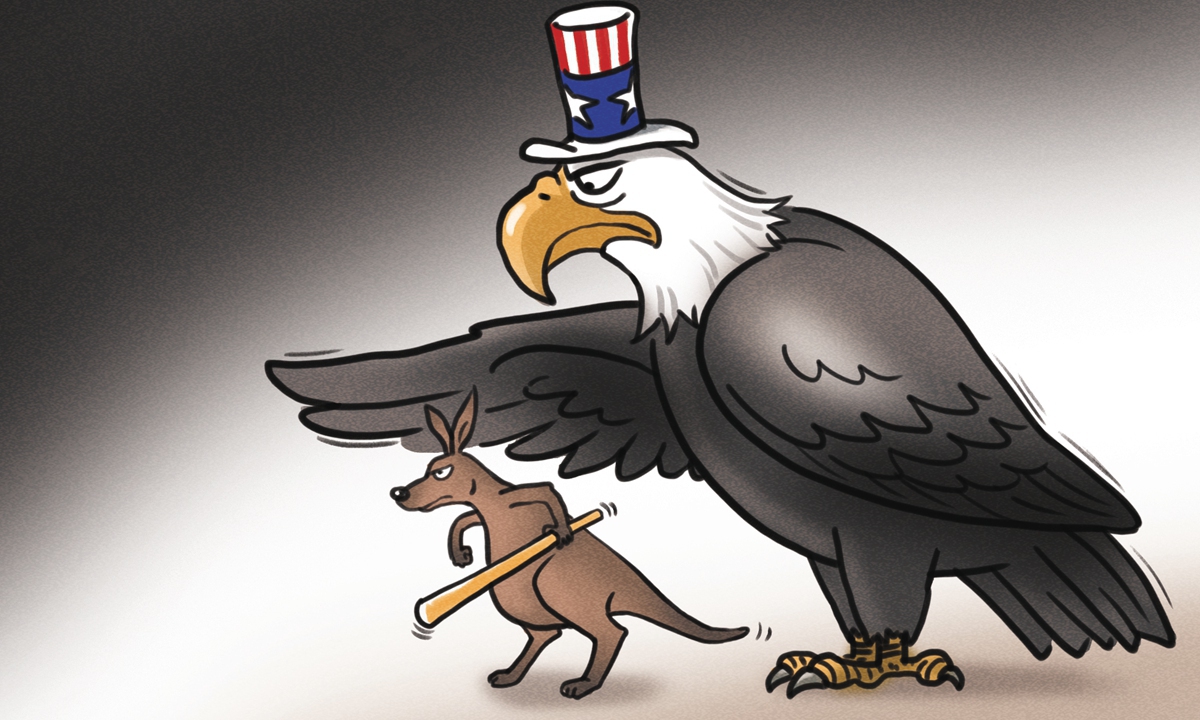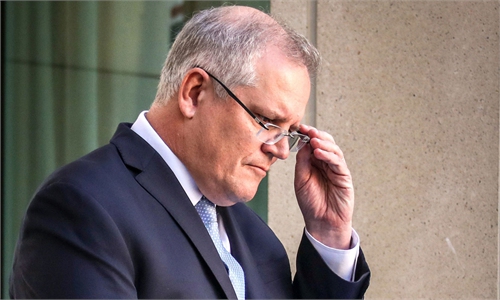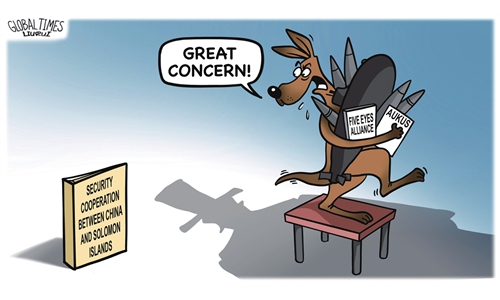Australia continues to boost defense budget amid ‘naive ambition’ of weaponizing self for US strategy

Australia US Illustration: Liu Rui/GT
Australia continues to take a dangerous path of military expansion with its latest move of allocating more than 2 percent of its GDP for military expenditure, which according to Chinese observers exposed its naive ambition of weaponzing itself to serve the US' strategy to contain China.
Canberra has drifted into the maelstrom of the US' strategy by spending more and more manpower and material resources, which would bring greater risks to its own country and ultimately sacrifice Australia's national interests, observers warned, revealing the immaturity and lack of autonomy in Australia's foreign and defense policy.
The latest move sounds an alarm to peace and stability not only in the South Pacific region but also in the international community, observers said, noting it could make Australia a potential threat to China.
Australian Prime Minister Scott Morrison said they decided to boost the defense budget above 2 percent of GDP in the 2022-23 budget. "In these uncertain times it is vital that Australia is well-positioned to tackle the challenges our country and our region face," Morrison said.
This is a significant increase in the country's defense budget, Chen Hong, president of the Chinese Association of Australian Studies and director of the Australian Studies Center at East China Normal University, told the Global Times on Wednesday.
Since 2016 when Australia vowed to collude with the US' pivot to the Asia-Pacific region, every year the country has increased the ratio in its defense spending, Yu Lei, chief research fellow at the research center for Pacific island countries at Liaocheng University in East China's Shandong Province, told the Global Times, predicting that Australia's defense budget will continue to rise.
During the two years, Australia has been stepping more and more on the road of military expansion, with ambitious projects including building nuclear-powered submarines under the AUKUS system for a base for nuclear-powered submarines, deploying missiles with long-range strike capability, establishing its Space Command, and increasing the country's fighting force by up to 18,500 people by 2040, Chen said.
Chen warned China to be on alert over Australia's aggressive military expansion.
Since the Obama administration, Washington has asked Canberra to increase military spending to have Australia assist the US in maintaining hegemony in the Asia-Pacific region amid the rise of China, Yu said.
"But its [defense budget boost] effect to China won't be that huge," Yu said. Considering Australia's GDP in 2020-21 was lower than that of East China's Jiangsu Province which reached $1.59 trillion in 2020, the total military expenditure this year in Australia is unlikely to be very large, Yu explained. As the country's economic situation is not good with rising unemployment, soaring prices and falling real incomes and living standards, its economic prospects could be worse in the new financial year, Yu predicted.
To serve the US' Indo-Pacific strategy, Australia is trying to weaponize itself while disregarding the negative impact such moves would have on Australia and its people, and the opportunism and adventurism in its foreign policy and national defense strategy have been exposed, Chen said.
Such policies which are lack of autonomy and maturity would bring greater risk to not only Australia but also the South Pacific region, Chen said.
Given that in the 2022-23 budget, Australia's aid was raised from $4.33 billion to $4.54 billion to its neighbors, especially those in the South Pacific region, the country is desperately trying to increase its influence and control over countries in the region and maintain the South Pacific region as its "backyard," Yu said.
However, to develop relations with China is the common aspiration of the island countries in the region, not China's unilateral pursuit, Yu said, noting that the economic, political and social effects of their cooperation with China went far beyond so-called aid from Australia.




